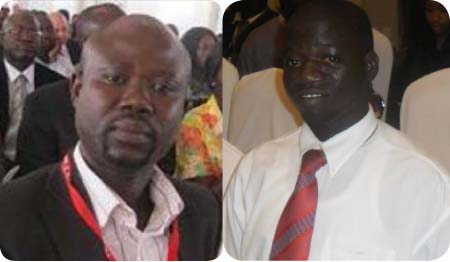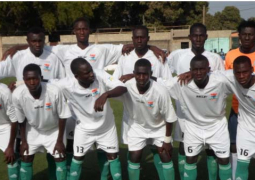
Musa Sheriff, editor-in-chief and publisher of The Voice newspaper, and Sainey M.K. Marenah, a freelance journalist, were charged with conspiracy to cause a misdemeanour and publication of false news with intent to cause fear and alarm to the public, which both denied.
The trial started with the reading of the amended charge to the accused persons, which they also denied.
The first prosecution witness, Lamin Jammeh, a police officer and a resident of Sinchu Sorry village in the West Coast Region, told the court that he recognised the accused persons.
He recalled that on 7 December 2013, there was a directive from the Office of the President through the office of the Inspector General of Police, requesting an investigation regarding the publication made in The Voice newspaper.
He said upon receiving the said directive, a panel was constituted to investigate the matter, in which he participated, and statements were obtained from the parties concerned, including the APRC spokesperson.
The panel reviewed and made some findings, including the fact that Musa Sheriff was editor-in-chief from 2008 to date, and that Sainey MK Marenah is a freelance journalist, the witness said.
He added that it was Sainey MK Marenah who provided the information to The Voice newspaper, and Musa Sheriff who edited the story for the publication.
On 30 November 2013, he went on, there was a political rally held in the village of Tanji and that there was no speaker at that meeting, who made mention of the defection of 19 Green Youths to the opposition United Democratic Party (UDP).
The panel found out that during this particular meeting in Tanji village, none of the Green Youths were staying in Tanji, but in Brikama, Batokunku, Kanilai and other diverse places, he added.
He said that on 6 December 2013, after The Voice newspaper published the said story of Sainey Manneh, the APPRC spokesperson reacted to the story by telling them that the said story was false, and after that The Voice wrote a report to that effect.
During the investigation, he added, the panel cautioned the accused persons, and this was after finding out that the said information was false.
At that juncture, the prosecuting officer, Corporal 4404 Camara, asked the witness whether he would be able to recognise the said news publication, and the witness confirmed the said publication.
The prosecutor then applied to tender it in evidence, but defence lawyer Lamin S. Camara objected and told the court that it was common knowledge that newspapers are not being printed by hand.
He added that the police prosecutor, Corporal Camara, did not satisfy the court with any sections of the relevant laws, citing the Evidence Act.
He said there was nowhere, where the witness said they had recovered, but instead said they had access to the said publication.
“I therefore say this newspaper is coming out of blue and I, therefore, urge the court to reject the said newspaper,” counsel argued.
In response, the police prosecutor told the court that it was common knowledge that newspapers are being printed by computers not by hand.
He said the Evidence Act is not applicable, as this particular witness could not say how the newspapers do their processing.
He said this particular witness said the panel found the said publication offensive, and so the witness could not know that.
Hearing continues on 19 February 2014, for ruling.
Sainey M.K. Marena and Musa Sheriff are accused on count one that on 6 December, 2013, in Banjul and diverseplaces to have conspired to cause misdemeanor among themselves to publish on the Voice Newspaper medium caption: “19 Green Youths Join the opposition UDP” dated 6 December 2013, and thereby committed an offence.
On count two the two journalists were accused that on aforementioned date, month and places, whilst employed as Editor-in-chief and reporter respectively at the Voice Newspaper medium, they made a publication with caption: “19 Green Youths Join the opposition UDP” dated 6 December 2013, Vol 6 No 117 ISSN; 07961308, knowing or having reason to believe that the said publication was likely to cause fear to the public or disturb the public peace, and thereby committed an offence.



